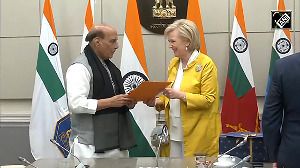As many as 10 lakh employees, of which seven lakh were award staff and another three lakh officers participated from all banks including foreign and private.
An award staff draws a salary of Rs 15,000 per month on an average while an officer draws around Rs 20,000 on an average - one day's salary of 10 lakh employees including award staff and officers comes to around Rs 55 crore (Rs 550 million) per day.
The economy loses money on account of every strike the banking sector faces, it saves too as employees end up sacrificing one day's salary for not attending office.
The affect is in the form of non clearance of cheques, loss of interest for not being able to deposit cash in banks branches and loss of money to the banks in form of non participating in call money markets and other short term investment avenue.
Banks also lose money by not being able to participate in the government securities trading etc. A portion of this loss is made up through non payment of salaries to employees not attending strike.
Nevertheless, as many as 50,000 bank employees went on strike in West Bengal on Tuesday to protest the centre's decision.
Banking operation in the metropolis and rest of West Bengal came to a standstill following a nation-wide strike by the bank employees to press for their demands today.
"The strike is total and no banking operation is going on in any of the bank across the state", Ashoke Dutta, convener of United Forum of Bank Unions, an umbrella organisation of the nine bank employees unions, said.
Almost 50,000 employees of the PS banks, regional rural banks and co-operative banks were taking part in the day-long strike in protest against the government's policies, he said.
All the private sector banks as well as foreign banks were closed as the employees were seen picketing with banners and posters in support of their demands.
The UFBU would continue with its struggle if the government failed to respond with change of policy after Tuesday's strike, he added.






 © 2025
© 2025